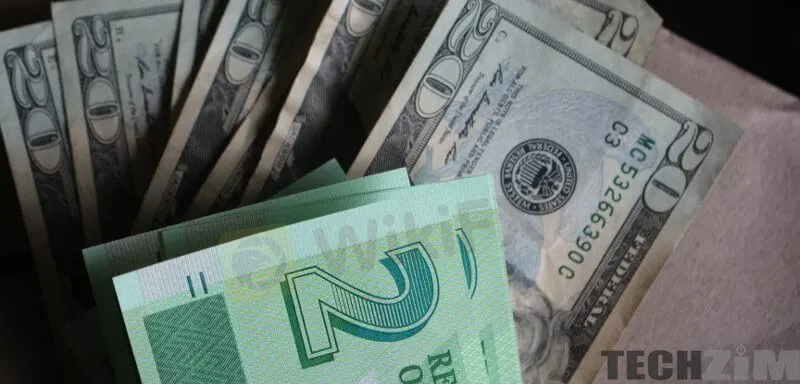简体中文
繁體中文
English
Pусский
日本語
ภาษาไทย
Tiếng Việt
Bahasa Indonesia
Español
हिन्दी
Filippiiniläinen
Français
Deutsch
Português
Türkçe
한국어
العربية
Firms in Zimbabwe have until December to register foreign exchange transactions or face heavy fines
Abstract:Companies in Zimbabwe have until the end of the year to register foreign currency sales or face rigorous audits and large fines, as the economy moves toward dollarization, which is still outpaced by foreign currency tax revenues.
On official and alternative currency markets, the local unit of exchange, the Zim dollar, has continued to suffer, prompting dealers to urge for hard currency sales.

President Emmerson Mnangagwa's administration, which is cash-strapped due to a lack of foreign investment, mineral smuggling, and its status as a net importer, is hoping for an increase in foreign currency income from the new operation, which targets enterprises that do not declare FX sales.
According to the Zimbabwe Revenue Authority, 'traders who are misrepresenting their financial records' by failing to register foreign currency transactions or converting such sales into Zimbabwean dollars for taxes reasons.
Furthermore, some businesses that engage in foreign currencies 'convert such transactions to Zimbabwean dollars for tax purposes.' As a result, the authorities has given these enterprises until December 31 to register all foreign currency sales.
'Zimra is inviting all merchants to come forward and make voluntary disclosures of all under-declared or non-payment of tax by December 31, 2021 to prevent rigorous audits, prosecutions, and fines that will be launched shortly after the deadline,' the authority stated in a notification.
The deadline set by Zimra for Zimbabwean enterprises to record foreign currency transactions comes amid a drop in export profits and strong demand for FX throughout the economy.
Zimbabwe's overall exports fell 5% to $597.2 million in August, according to Zimstats, with imports at $667.5 million for the same period.
The Zimbabwean central bank has also been struggling to accommodate industry's foreign currency requests for retooling, raw material imports, and the revival of the industrial sector.
The payment of foreign currency bonuses to public officials will put further strain on the government's foreign currency resource base.
On Monday, government workers' labor organizations stated the bonuses would be available in foreign currency from banks. Previously, bonuses were liquidated into local currency using the official exchange rate.
The incentive would be available in USD, according to the Zimbabwe Confederation of Public Sector Trade Unions.
The Zimbabwe dollar's '... weakness is anticipated to endure,' according to Old Mutual Zimbabwe analysts, for the rest of the current quarter.
Disclaimer:
The views in this article only represent the author's personal views, and do not constitute investment advice on this platform. This platform does not guarantee the accuracy, completeness and timeliness of the information in the article, and will not be liable for any loss caused by the use of or reliance on the information in the article.
Read more

WikiFX Broker Assessment Series | Lirunex: Is It Trustworthy?
In this article, we will conduct a comprehensive examination of Lirunex, delving into its key features, fees, safety measures, deposit and withdrawal options, trading platform, and customer service. WikiFX endeavours to provide you with the essential information required to make an informed decision about utilizing this platform.

Italy’s CONSOB Blocks Seven Unregistered Financial Websites
Italy’s CONSOB ordered seven unauthorized investment websites blocked, urging investors to exercise caution to avoid fraud. Learn more about their latest actions.

STARTRADER Issues Alerts on Fake Sites and Unauthorized Apps
STARTRADER warns against counterfeit sites and apps using its brand name. Protect yourself by recognizing official channels to avoid fraudulent schemes.

Dukascopy Bank Expands Trading Account Base Currencies
Dukascopy Bank now offers AED and SAR as base currencies for trading, expanding options for clients to fund accounts in Dirham and Riyal.
WikiFX Broker
Latest News
CWG Markets Got FSCA, South Africa Authorisation
Amazon launches Temu and Shein rival with \crazy low\ prices
CySEC Warns Against Unauthorized Investment Firms in Cyprus
JUST Finance and UBX Launch Multi-Currency Stablecoin Exchange
XM Revamps Website with Sleek Design and App Focus
TradingView & Mexico’s Uni. Partnership, to Enhance Financial Education
Something You Need to Know About SogoTrade
Global Shift in Cryptocurrency Taxation: Italy and Denmark Chart New Paths
Webull Introduces 24/5 Overnight Trading to Extend U.S. Market Access
eToro Launches Global-Edge Smart Portfolio: A Balanced Approach to Growth and Stability
Currency Calculator


